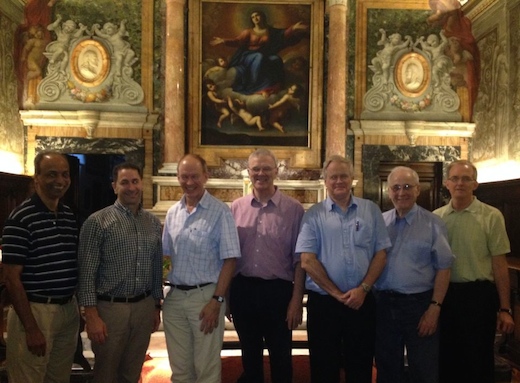At our annual meeting with Fr General in Rome this month, the six Jesuit Conference presidents identified significant strategies that are bearing fruit for greater solidarity among Jesuits and our colleagues globally, and planned new cooperative measures. Since the primary goal of conferences concerns mission, we dealt with questions such as restructuring of governance arrangements, solidarity in sharing resources across the Society, cooperation in the formation of Jesuits and promotion of studies in Ignatian spirituality.
We were briefed on steps to be put in place for the forthcoming General Congregation 36 scheduled for 2016. Under a new formula, the General Congregation will commence when delegates meet at conference level in October 2015. Its first duty is to elect delegates for the preparatory commissions, and in this, it will be helped by topics a preliminary committee (coetus praevius) will propose after sifting the input from province congregations and elsewhere. The new provisions require each conference to choose a brother as a delegate from among those nominated by province congregations. This will be done by an electronic vote in August 2015.
Measures taken to bolster child protection were identified and we reviewed the guidelines to live our celibacy in depth. Each president undertook to set up a task force to review, and where necessary, strengthen the protocols in place across the conferences for promoting and ensuring standards in the protection of children as well as for receiving and dealing with complaints.
Steps taken to reshape governance in provinces and regions of the Society were reviewed and compared. We learned that ultimately there will be four USA provinces and, already in 2014, the USA provinces will join with the two Canadian provinces to form a new conference in North America. Within a few years it is planned that there will be one bi-lingual Canadian province. The Spanish provinces united into one this year. Fifteen Latin American provinces and two regions are step by step becoming 11 provinces, with further merging possible in later years. Similar fruitful steps are being taken in Europe and parts of Asia. Some areas claim they are too “different” to unite with others, but ultimately it is anticipated that the Society’s universal mission and identity will aid rather than detract from local commitments. It is understood that greater economy in governance arrangements does not remove the need for locally relevant apostolic planning and inculturation in depth. Despite inevitable resistance, most provinces have responded with decisive discernment to Fr General’s 2011 letter on the Renewal of Province Structures in the Service of Universal Mission.
Solidarity in providing for Jesuit formation was an encouraging topic. Although impressive local and global cooperation is possible through conferences and bi-lateral agreements, resources for funding the formation of Jesuits are still unevenly distributed. Yet there is both desire and openness for burden sharing in all parts of the Society. Fr General asked conferences to continue to enable a way forward. Each province is to examine what it needs and what it can share. Some provinces have accumulated funds, but have few Jesuits in formation, while younger provinces and regions, particularly in Africa and some parts of Asia and Eastern Europe, are receiving vocations but have not yet built up their reserves. With this information now available, sharing has begun within conferences, as formation is seen more and more as a conference activity. While local fundraising for formation is still greatly needed, this solidarity between conferences will enable a closer match between needs and resources globally.
Presidents reported on the reception and implementation of the recent letters of Fr General on Intellectual Formation of Jesuits and on the Intellectual Apostolate, or “learned ministry”. The documents have been well received and point to the desire for Jesuit formation that is well integrated, interdisciplinary and intercultural, and promotes reflection on experience.
The role of Jesuit Refugee Service in responding to the urgent crises of displacement in such places as Syria, Iraq and Congo was lauded, and deeper engagement of conferences was asked for and promised.
Proposals to develop studies in Ignatian spirituality, already initiated in Europe and North America, were briefly outlined. The presidents indicated openness to these plans and identified steps to engage in them in all conferences. The desire of Fr General for a deeper integration of faith, justice and collaboration led us into an exploration of these dimensions in the apostolic life of the conferences.
Fr General and his assistants already have an impressive global view, aided by the Society’s extraordinary system of internal communication, a system developed by Ignatius himself. The conferences offer an enhanced mechanism for acting decisively and corporately, both locally and globally, on the ideals expressed in documents and letters from Rome. While provincials carry a great responsibility for coherent implementation of the Society’s mission within their provinces, the conferences enable them to engage cooperatively in the Society’s universal mission. As we develop mechanisms to enable greater global solidarity, we can get a better fix on who is without access to the services that the Society and friends can offer. Light is shed on how we might build on or rationalize our institutions and commitments in response to needs.
Fr Mark Raper SJ
President, Jesuit Conference of Asia Pacific
The Jesuit Conference presidents meeting with Fr General was held from September 15 to 18, 2014 in the Jesuit Curia in Rome.







